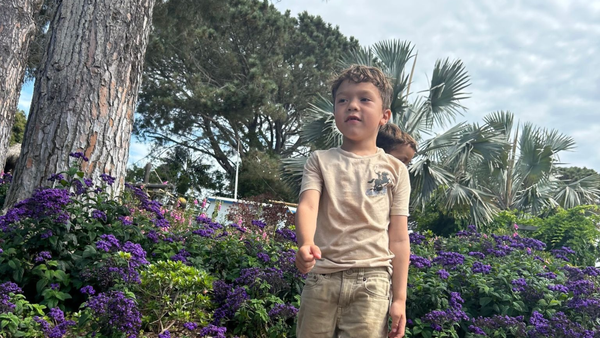
Kirsti Hadley is still reeling from how quickly her autistic son’s education has crumbled and how she cannot access help to get him back on track.
Since November 2022, her 12-year-old son has only managed to spend a few hours a week at Varndean school in Brighton.
Her son was looking forward to his large, new secondary school but his mother knew the transition from his small primary school would be overwhelming. Her request for a reduced timetable, however, was turned down, with the school also insisting they needed to observe her son for a full academic year before supporting him in the education, health and care (EHC) plan he required to access extra support.
“Instead of letting her son start on a staggered schedule and build up, they said he had to fail at a full timetable first,” Hadley said. “That was traumatic. He hates failing, what child doesn’t?”
Nevertheless, her son started his new school full of positivity. Soon, however, he was having a panic attack every time he tried to leave home for school. The attacks were so severe it would take him the entire day to recover.
“After a few weeks of this, he simply couldn’t go in any more – he was completely burnt out and highly anxious,” said his mother.
Her son now goes to school for – at best – just one day a week for classes in forest school, drama and animal therapy.
“He has lost so much core learning that I can’t see him ever catching up,” said Hadley. “He’s still on waiting lists for CAMHS [child mental health services] to give him medication despite them accepting his private autism and ADHD diagnosis. He has yet to see the school counsellor and his EHC plan is still not submitted. There’s not one shred of support from any other source. It’s terrifying: the way things are going he’s not going to get any educational qualifications at all.”
A spokesperson from Varndean school said: “Varndean is an inclusive school and supports hundreds of students with an autism diagnosis or those who are on a pathway. We support families in this difficult time where external services such as CAMHS are under pressure and despite the pressures our school is facing, alongside all schools, with reduced funding.”
Nevertheless, the toll taken on her son and his mother is enormous. “I’m now on my knees financially, forced to rely on benefits,” said Hadley. “It’s a very real possibility that I might have to sell our home if something doesn’t change soon.
“The system isn’t just failing children, it’s failing families and society as a whole; sucking us all out of the workforce, for the sake of some simple school adjustments,” she added.
Only 29% of autistic people are in employment, research shows, while at least 80% of autistic adults suffer mental health issues, often linked to the isolation, poverty and depression and anxiety of prolonged unemployment.
One thing that would help create a society that works for autistic children before they reach this point of crisis is, experts agree, systemic change in our education system – namely improving the school environment, reducing sensory overload, tailoring schoolwork and assessment for autistic pupils, and improving peer relationships.
“It’s not to say that there aren’t some pockets of greatness and goodness but in general, school for autistic children is grim,” said Sarah Broadhurst, CEO of the Autism Education Trust (AET), launched in 2007 with support and funding from the Department for Education (DfE) in England.
“Most local authorities have a lack of specialist placements. Most schools have a lack of Senco [special needs] teachers. Most teachers don’t have sufficient knowledge of autism to differentiate bad behaviour from autistic burnout,” she said. “Added to which, the DfE’s driving force on behaviour and attendance doesn’t support schools to be flexible or nurturing.”
Schools have a legal duty to make reasonable adjustments for pupils’ needs. But with funding squeezed across the education system, finding the funding, resources and staff to make those adjustments in already over-stretched schools can be impossible. Almost three-quarters of parents say their child’s school place does not fully meet their needs.
Even more disturbingly, one in five parents say their child has been informally excluded in the last two years. Informal exclusions, where children are sent home and asked not to come in but the exclusion is not officially recorded, are illegal.
Mel Merritt from the National Autistic Society said that with demand for diagnoses increasing by 50% in the past year, parents can find it almost impossible to get the support they need.
“Parents are having to fight really hard, for as long as three years, to get even a little bit of the support they’re entitled to because the system is so over-stretched,” she said. “At that point, the child has been through so much, that the support they finally get is no longer enough.”
There are though, beacons of good practice: schools working hard to help their autistic pupils. Last week, Ambitious about Autism launched a nationwide project designed by young autistic people to create an environment of acceptance and support in schools.
The free, online “Autistic and OK” toolkit helps the whole school community – autistic pupils, their non-autistic peers, teachers and parents and carers – learn how to empower autistic pupils to take control of their own mental health and wellbeing.
“Schools are currently failing autistic pupils like me because they don’t have the time, funding or specialist staff to identify or support autistic pupils who aren’t coping but aren’t being disruptive and exhibiting stereotypical autistic behaviours,” said Lily, 17, who helped devise the programme. “But this programme is specifically designed for schools in that position: we’ve done all the work for them. They just have to follow the steps we’ve given them.”
Another new approach being trialled in three local councils across the UK by the AET has also had a substantial impact. South Lincolnshire recorded an 80% decline in permanent exclusions of autistic students after adopting the process “Mainstream Plus” which defines itself as “recognising the need for specialist services, early intervention and therapeutic intervention but emphasising the need for support aimed at system leaders and the workforce that results in culture change”.
Cullum Centres represent another successful approach. Largely funded by the Cullum Family Trust and the National Autistic Society, they are specialist centres in – so far – five mainstream schools. Designed for autistic young people who have good academic potential but find it difficult to learn in busy school environments, Cullum Centres enable pupils to stay in a mainstream school near to home and achieve their full potential through the help of specialised staff able to give tailored support.
For those with the money, there are online schools aimed at school refusers and those not suited to mainstream learning, including King’s Interhigh and Academy 21. Duke’s Education, the first UK-wide hybrid school offering home and class learning, is opening later this year.
But most autistic children don’t have the opportunity to use these new models. As Hadley said, “If the government just put the money into the system now to bring down waiting lists and increase support, they’d claw it back in a few years because the damage that delays cause wouldn’t be so appalling.”
She added: “I’m on my knees, financially and emotionally,” she said. “My entire family’s mental and financial health has been trampled. Even when [his] support eventually comes – and I have to believe that one day it will come – how do we recover from this deep, sustained level of harm and trauma? I’m not sure that we ever can. Not fully.”
• This article was amended on 5 March, 2024 to remove some personal details







